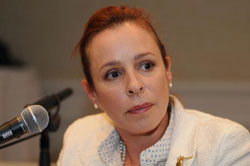Physicians Assistants are Expected to Grow 30 Percent Within the Next Decade
The University announced the approval of new Master of Science Physician Assistant program (MSPA) to begin the Fall 2014 semester. The MSPA will be a three-year, full-time graduate level program offered to University students and those interested. The program is in increased demand and has an expectancy to continue to increase in the coming years.
The Physician Assistant (PA) program was recently granted accreditation provisional status by the Accreditation Review Commission. The program will be the first of its kind available in Monmouth and surrounding counties throughout New Jersey.
A PA is a medical professional who works in conjunction with health professionals, is a graduate of an accredited program and is eligible to take the national certifying exam. The exam will allow the PA to become state-licensed to practice medicine with the supervision of a physician.
The Bureau of Labor Statistics predicts that the PA profession will grow 30 percent within the next decade. Carol Biscardi, Director of the Physician Assistant Program said, “It is projected that the PA professionals will enjoy the second highest employment demand in the nation.”
The demand for PA programs has already seen signs of an increase. The Physician Assistant Education Association estimates that across America, there are currently eight candidates seeking one available PA program seat.
Thomas Pearson, Provost/Vice President for Academic Affairs, said the University wanted to ensure that the new graduate programs selected would offer long-term employment opportunities for graduates. “I found that the employment demand for Physician Assistants will be extremely high, especially for 2015 and beyond, and that tipped the balance in terms of selecting from among the health sciences programs we were considering at the time,” said Pearson.
President Dr. Paul R. Brown explained in a University news release, that the demographics on aging indicate that something must be done to meet the nation’s future health care needs. Brown added, “The PA program is a great addition to our allied health offerings and will help meet the growing demand for primary care providers in the region.”
The job requirements of a PA include eliciting medical history, performing physical examinations, ordering and interpreting laboratory tests, as well as diagnosing and treating patient illnesses. According to Biscardi, a large component of a PA’s responsibility is health promotion and patient education and the job of a PA can be served in a hospital setting, nursing home or satellite office.
Biscardi explained that while the University’s focus is teaching PA students how to offer primary care, a PA degree has awarded students a number of different professions such as orthopedics, cardio-thoracic surgery, or trauma surgery.
The University PA program requires that students applying must hold a bachelor degree, complete specific prerequisite courses, have a minimum of 200 hours of health care experience, and letters of recommendation must be submitted with an autobiographical statement.
During the three-year full-time program, Biscardi explains the first year will teach students basic science and clinical experiences and the second and third years will work primarily off-campus completing clinical clerkships.
The clinical clerkships students complete vary among, internal medicine, general surgery, pediatrics, family medicine, psychiatry, emergency medicine, women’s health, and geriatrics/long-term care. Students have the opportunity to complete two elective clerkships during the graduate program.
Students are also required to come to campus once per week to complete coursework while working through case studies with co-medical directors and other guest clinical instructors.
“The program is unlike most traditional graduate programs in that students will carry anywhere from 15 to 19 credits per semester,” Biscardi said. “The amount of instruction is intense because of the volume of material we must teach.”
During the first year of the program students work in the classroom approximately 35 hours each week while being tested frequently to ensure students are “competent in the material they are being taught,” Biscardi said.
Introduction of the PA program was part of a ten-year strategic plan initiative to extend the graduate school while welcoming new degree programs that meet public health care needs.
Biscardi explained that the MSPA was introduced based on the efforts of many including the Provost’s Office, Graduate School, University health care professionals, experts in the physician assistant field, the University enrollment management division, the University Cabinet and Board of Trustees and well as previous University President, Paul Gaffney.
“I probably won’t take part of the program personally being a science major I totally support expanding the science school at Monmouth.” Amanda Billotti, junior marine and environmental policy major said.
“In my view this program will have enormous benefits for Monmouth University students, not only in opening an important career and employment pathway for graduates from our program but also in providing an educational and career avenue for undergraduate students in the sciences and health studies at Monmouth,” said Pearson.
The MSPA classes will be held in University Health Sciences Center, located in Monmouth Park Corporate Center on Route 36 in West Long Branch, NJ. Applications are currently being accepted for the 2014 fall semester. The program will offer a capacity of 30 seats per semester.
“I am excited about the program we’ve built,” said Biscardi. “Our faculty has a combined experience in graduate medical education of greater than 80 years. We are able to put the best practices from all our experiences into the curriculum to meet the needs of the next generation of PAs.”



